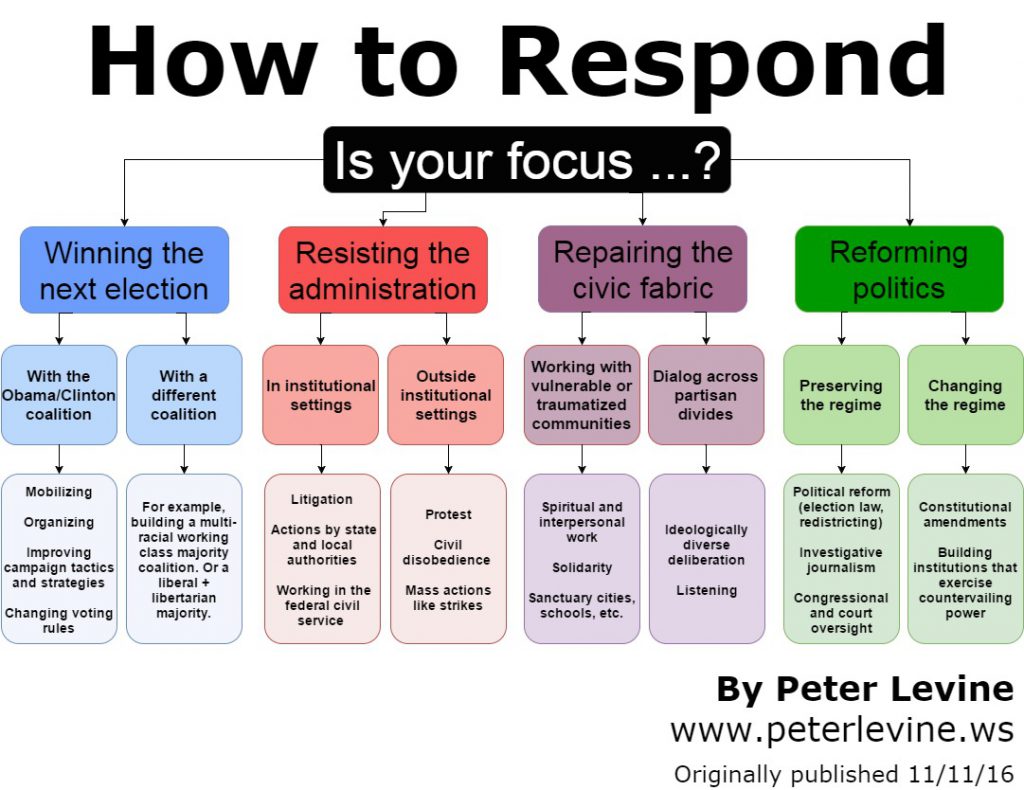With the elections behind us, Essential Partners, an NCDD sponsor member is offering post-election support. This assistance arrives straight to your inbox in the form of one newsletter per week over the course of the next 4 weeks. Each newsletter comes with guiding prompts and resources from the pool of experts and 30 years of experience of EP to better assists in continuing the work of healing and caretaking in all of our community circles. Click here to sign up to the EP email newsletter list! Read below to find the upcoming themes and for the original post here.
WHAT HAPPENS NEXT? EP OFFERING 4 WEEKS OF POST-ELECTION SUPPORT
![]() The election is finally here. Years of campaigning, media coverage, social media shares, and protests have culminated in this one event.
The election is finally here. Years of campaigning, media coverage, social media shares, and protests have culminated in this one event.
Now we all turn to the pressing question: what happens next?
During this time of extreme polarization, fear of an uncertain future, and a general reticence to speak with people about what matters most, many dialogue organizations are bringing folks together for post-election conversations.
But we think there is a lot of work to be done—on a personal level, in our trusted circles, and in our larger networks—before our communities are healthy enough to come together again for that kind of dialogue.
Essential Partners will spend the next four weeks doing what we do best—empowering you to repair the fabric of your community, piece by piece. In one email each week over the next four weeks, we will draw on 30 years of experience to offer guidance and resources in support of this crucial work. Click here to sign up to the EP email newsletter list. Here’s what we have planned.
Week 1: Your Best Political Self
We’ll begin with ourselves, taking some much-needed time and space to reflect on what matters most to us and who we want to be.
In this first week, we’ll share a tool to help you think about the stories that inform your political values, the people who influenced you, and the places where you grew into yourself.
We want to help you become curious about who your best political self is—and how that connects to what you decide to do now that the election season is over.
Click here to download the free Week 1 resource.
Week 2: A First-Draft Conversation
Next, we’ll give you a resource to have an intentional conversation with someone who knows you best, someone you trust and feel fully yourself with.
It has been hard to escape the polarizing forces of this election cycle and easy to lose yourself in the campaign. Our resource will help you reflect deeply, with someone close to you, on how you’re doing as this election season comes to a close and on what matters most as you think about the challenges you’ll face next.
This is a first draft conversation. It might be messy. Our hope is that you will be able to worry less about speaking carefully in this first conversation because you’re already so well understood by the other person.
We want to invite you to practice talking about your values and priorities in ways that feel connecting, valuable, and important.
To be published: Tuesday, November 17
Week 3: Building Community
With three weeks of reflection, and some space from the election, try connecting with someone in your life who might feel isolated because of the outcome. This could be a family member, colleague, fellow parishioner, or an acquaintance.
That person doesn’t have to believe something different than you (although they might). They might feel like they’re the only person with their beliefs in the room, the only one who hasn’t responded in the way others have, that they aren’t welcome in conversations, or have felt excluded in the past.
You’ll be given guidance on how to help that person feel heard, fully and seriously. It’s a chance to build or re-build relationships on a foundation of trust and understanding.
To be published: Tuesday, November 24
Week 4: A Group Conversation
Finally, we want you to think of this series as culminating in group conversations. In the last week, we’ll provide tools for you to lead a group discussion that welcomes different perspectives and begins to repair your community after the divisive 2020 election.
This doesn’t have to be a formal dialogue. Maybe it’s a family conversation over a holiday dinner, part of a check-in during your weekly team meeting, or part of a classroom discussion.
To be published: Tuesday, December 1
Whatever the circumstances are, know that better conversations don’t happen overnight. It takes work and time for people to bring their best selves to a discussion across different perspectives—especially in the wake of a polarized conflict like this. But these are necessary conversations if we want to move forward together.
Click here to sign up to the EP email list if you want to receive post-election resources.
If you feel like you need help urgently, you can also reach out to us for a free consultation. We are here to help all those who do the hard work of tending to the health of their community.
You can find the original version on this on the Essential Partners’ site at https://whatisessential.org/what-happens-next-ep-offering-4-weeks-post-election-support.










